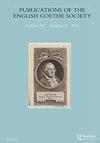Material Exchange, Symbolic Recognition: Weltliteratur as Discourse and Practice in Goethe, Carlyle, and Emerson
IF 0.1
3区 文学
0 LITERATURE, GERMAN, DUTCH, SCANDINAVIAN
引用次数: 0
Abstract
ABSTRACT Thomas Carlyle’s activity as a translator and promoter of German literature in nineteenth-century Britain was among the chief signs the ageing Goethe read as inaugurating ‘the epoch of world literature’. American essayist Ralph Waldo Emerson, who became Carlyle’s transatlantic friend and ally soon after Goethe’s death, shared the impression that their contemporary moment witnessed global contact and exchange on an unprecedented scale. Reconsidering the Goethe–Carlyle–Emerson nexus through the lens of the concrete materiality of their transnational interactions, this essay demonstrates that Weltliteratur to the three of them was something discursive as well as material, textual as well as social, and theoretical as well as practical.物质交换、符号认同:歌德、卡莱尔和爱默生的世界文学话语与实践
托马斯·卡莱尔在19世纪英国作为德国文学的译者和推动者的活动,是年迈的歌德所读到的开创“世界文学时代”的主要标志之一。美国散文家拉尔夫·沃尔多·爱默生在歌德去世后不久成为卡莱尔的跨大西洋朋友和盟友,他也有这样的印象:他们的当代见证了前所未有的全球接触和交流。通过他们跨国互动的具体物质性来重新考虑歌德-卡莱尔-爱默生的关系,本文表明,对他们三人来说,世界文学既是话语的,也是物质的,既是文本的,也是社会的,既是理论的,也是实践的。
本文章由计算机程序翻译,如有差异,请以英文原文为准。
求助全文
约1分钟内获得全文
求助全文
来源期刊

Publications of the English Goethe Society
LITERATURE, GERMAN, DUTCH, SCANDINAVIAN-
CiteScore
0.10
自引率
0.00%
发文量
15
 求助内容:
求助内容: 应助结果提醒方式:
应助结果提醒方式:


